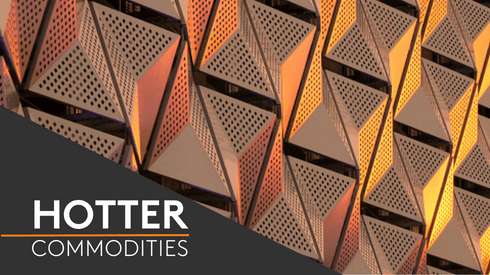Volume has been average with 8,535 lots traded as of 07.08 am London time.
On Tuesday morning the metals, equities and bond markets were all looking weak and the base metals complex closed down by an average of 1%, led by a 3.3% fall in nickel prices, but underlying tails on many of the metals’ candlestick charts showed there was dip buying around. Indeed copper closed off by just 0.1% at $7,080 per tonne, having been as low as $6,994 per tonne earlier in the day, and with prices up again this morning it does suggest underlying sentiment remains strong.
This is especially so considering China’s manufacturing purchasing manager’s index (PMI) came in at 51.3, below an expected reading of 51.5 and lower than the 51.6 recorded in December, which could have added to the downward pressure.
The precious metals are also firmer this morning with average gains of 0.5%, with gold prices at $1,343.02 per oz, this after a low of $1,334.50 per oz on Tuesday.
On the Shanghai Futures Exchange today, base metals prices are down by an average of 0.7% – nickel prices lead on the downside with a 2.2% drop, with the others following: lead (-0.8%), aluminium (-0.7%), zinc (-0.4%), tin (-0.3%) and copper that is off the least with a fall of 0.1% to 53,220 yuan ($8,408) per tonne. Spot copper prices in Changjiang are down by 0.8% at 52,600-52,780 yuan per tonne and the LME/Shanghai copper arbitrage ratio has dropped to 7.53, from 7.46 on Tuesday.
The fact that the spot price is showing a bigger drop than the futures, suggests the futures prices have rallied since the spot prices were set, while the drop in the arbitrage ratio, also shows SHFE copper prices are relatively weaker than LME prices and that may be due to the poor PMI data weighing on SHFE sentiment.
In other metals in China, iron ore prices are down by 1.4% at 510 yuan per tonne on the Dalian Commodity Exchange. On the SHFE, steel rebar prices are down by 0.4%, while gold and silver prices are both off by 0.3%.
In wider markets, spot Brent crude oil prices are up by 0.31% at $68.26 per barrel, the yield on US 10-year treasuries has eased to 2.70%, and the German 10-year bund yield has also eased to 0.68%.
Equities in Asia are mixed today: Nikkei (-0.83%), Kospi (-0.05%), CSI 300 (0.47%), Hang Seng (0.45%) and ASX 200 (0.25%). This follows a weak performance in western markets on Tuesday, where in the United States the Dow Jones closed down by 1.37% at 26,076.89, and in Europe where the Euro Stoxx 50 closed down by 1% at 3,606.75.
The attempted rebound in the dollar index in recent days appears to be petering out with the index recently quoted at 88.83 – this after yesterday’s high of 89.65 and the low of 88.43 on January 25. The dollar’s weakness has boosted the other currencies: euro (1.2459), sterling (1.4205), Australian dollar (0.8099) and yen (108.61). The yuan has also resumed its powerful rally, it was recently quoted at 6.2865, the strongest it has been since August 2015.
On the economic agenda today is exceptionally busy – while China’s manufacturing PMI disappointed, the non-manufacturing PMI climbed to 55.3, from 55, Japanese housing starts and consumer confidence were weaker than expected, as were German retail sales. Data out later includes French, Spanish and EU consumer price indices (CPI), readings on German, Italian and EU unemployment, and US data including ADP non-farm employment change, employment costs, Chicago PMI, pending home sales and crude oil inventories. In addition, there is the US Federal Open Market Committee interest rate decision and statement.
High price levels and choppy trading go hand-in-hand and that is what we have been seeing of late. Yesterday’s weakness in the metals provided an opportunity for follow-through selling to emerge, but dip buying was seen instead. This suggests strong underlying sentiment. We remain bullish basis the fundamentals so expect good dip buying, but with the Chinese Lunar New Year some two weeks away, it will be interesting to see if buyers have the energy to push prices into new high ground.
The pullback in the precious metals seems to be consolidation, like the base metals the price dips have attracted buying – this suggests metal-commodities remain in vogue.
Metal Bulletin publishes live futures reports throughout the day, covering major metals exchanges news and prices.





